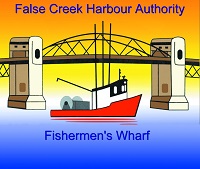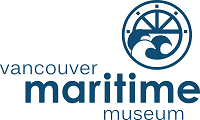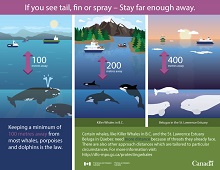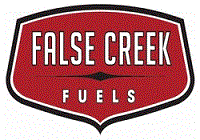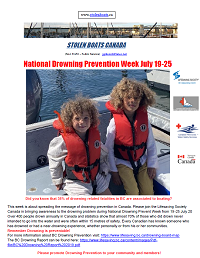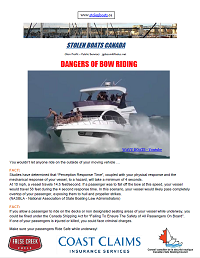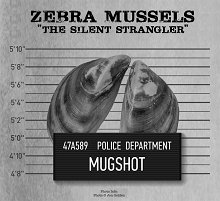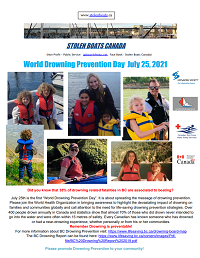 |
World Drowning Prevention Day 2021
Did you know that 35% of drowning related fatalities in BC are associated to boating?
July 25th is the first “World Drowning Prevention Day”. It is about spreading the message of drowning prevention. Please join the World Health Organization in bringing awareness to highlight the devastating impact of drowning on families and communities globally and call attention to the need for life-saving drowning prevention strategies. Over 400 people drown annually in Canada and statistics show that almost 70% of those who did drown never intended to go into the water and were often within 15 metres of safety. Every Canadian has known someone who has drowned or had a near-drowning experience, whether personally or from his or her communities.
Remember Drowning is preventable!
For more information about BC Drowning Prevention visit: https://www.lifesaving.bc.ca/drowning-board-map
The BC Drowning Report can be found here: https://www.lifesaving.bc.ca/content/images/Pdffile/BC%20Drowning%20Report%202019.pdf
Please promote Drowning Prevention to your community!
|
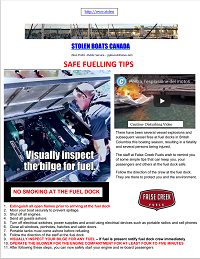 |
SAFE FUELLING TIPS REMINDER
There have been several vessel explosions and subsequent vessel fires at fuel docks in British Columbia this boating season, resulting in a fatality and several persons being injured. The staff at False Creek Fuels wish to remind you of some simple tips that can keep you, your passengers and others at the fuel dock safe. Follow the direction of the crew at the fuel dock. They are there to protect you and the environment.
1. Extinguish all open flames prior to arriving at the fuel dock
2. Moor your boat securely to prevent spillage.
3. Shut off all engines. 4. Send all guests ashore.
5. Turn off electrical switches, power supplies and avoid using electrical devices such as portable radios and cell phones
6. Close all windows, portholes, hatches and cabin doors.
7. Portable tanks must come ashore before refueling.
8. Follow the direction of the staff at the fuel dock
9. VISUALLY INSPECT YOUR BILGE FOR ANY FUEL – If fuel is present notify fuel dock crew immediately
10. OPERATE THE BLOWER FOR THE ENGINE COMPARTMENT FOR AT LEAST FOUR TO FIVE MINUTES
11. After following these steps, you can now safely start your engine and re-board passengers |
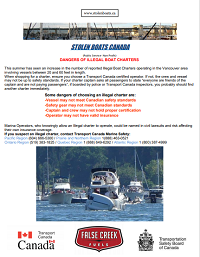 |
DANGERS OF ILLEGAL BOAT CHARTERS
This summer has seen an increase in the number of reported Illegal Boat Charters operating in the Vancouver area involving vessels between 20 and 60 feet in length. When shopping for a charter, ensure you choose a Transport Canada certified operator. If not, the crew and vessel may not be up to safety standards. If your charter captain asks all passengers to state “everyone are friends of the captain and are not paying passengers”, if boarded by police or Transport Canada inspectors, you probably should find another charter immediately. Marina Operators, who knowingly allow an Illegal charter to operate, could be named in civil lawsuits and risk affecting their own insurance coverage.
If you suspect an illegal charter, contact Transport Canada Marine Safety:
Pacific Region 604-666-5300
Prairie and Northern Region 1-888-463-0521
Ontario Region 519-383-1825
Quebec Region 1-888-649-6292
Atlantic Region 1-800-387-4999 |
|
NATIONAL
DROWNING PREVENTION WEEK JULY 19-25, 2020
This
week is about spreading the message of drowning prevention
in Canada. Please join the Lifesaving Society Canada in bringing
awareness to the drowning problem during National Drowning
Prevent Week from 19-25 July 2020. Over 400 people drown annually
in Canada and statistics show that almost 70% of those who
did drown never intended to go into the water and were often
within 15 metres of safety. Every Canadian has known someone
who has drowned or had a near-drowning experience, whether
personally or from his or her communities.
Remember
Drowning is preventable!
For more information about BC Drowning Prevention visit the
Lifesaving
Society BC and Yukon Branch website. or read the BC
Drowning Report. |
|
DANGERS
OF BOW RIDING
You wouldn’t
let anyone ride on the outside of your moving vehicle …
FACT:
Studies have determined that “Perception Response Time”,
coupled with your physical response and the mechanical response
of your vessel, to a hazard, will take a minimum of 4 seconds.
At 10 mph, a vessel travels 14.5 feet/second. If a passenger
was to fall off the bow at this speed, your vessel would travel
58 feet during the 4 second response time. In this scenario,
your vessel would likely pass completely overtop of your passenger,
exposing them to hull and propeller strikes. (NASBLA - National
Association of State Boating Law Administrators)
FACT:
If you allow a passenger to ride on the decks or non designated
seating areas of your vessel while underway, you could be
fined under the Canada Shipping Act for “Failing To
Ensure The Safety of All Passengers On Board”. If one
of your passengers is injured or killed, you could face criminal
charges.
Make sure your passengers Ride Safe while underway! |
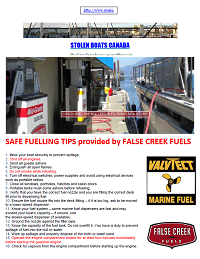 |
SAFE
FUELLING TIPS provided by FALSE CREEK FUELS
1.
Moor your boat securely to prevent spillage.
2. Shut off all engines.
3. Send all guests ashore.
4. Extinguish all open flames.
5. Do not smoke while refueling.
6. Turn off electrical switches, power supplies and avoid
using electrical devices
such as portable radios.
7. Close all windows, portholes, hatches and cabin doors.
8. Portable tanks must come ashore before refueling.
9. Verify that you have the correct fuel nozzle and you are
filling the correct deck
fill prior to dispensing fuel.
10. Ensure the fuel nozzle fits into the deck fitting –
if it is too big, ask to be moved
to a lower-speed dispenser.
11. Know your fuel system – some marine fuel dispensers
are fast and may
exceed your boat’s capacity – if unsure, use
the slower-speed dispenser (if available).
12. Ground the nozzle against the filler pipe.
13. Know the capacity of the fuel tank. Do not overfill it.
You have a duty to prevent
spillage of fuel into the hull or water
14. Wipe up spillage and properly dispose of the cloth or
towel used.
15. Operate the engine compartment blower for at least four
minutes immediately
before starting the gasoline engine.
16. Check for vapours from the engine compartment before starting
up the engine. |
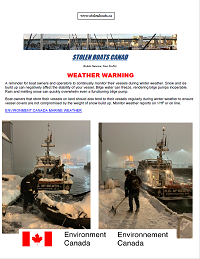 |
WEATHER
WARNING - ICE BUILD-UP
A
reminder for boat owners and operators to continually monitor
their vessels during winter weather. Snow and ice build up
can negatively affect the stability of your vessel. Bilge
water can freeze, rendering bilge pumps inoperable. Rain and
melting snow can quickly overwhelm even a functioning bilge
pump.
Boat owners that store their vessels on land should also tend
to their vessels regularly during winter weather to ensure
vessel covers are not compromised by the weight of snow build
up. Monitor weather reports on VHF or on line.
ENVIRONMENT
CANADA MARINE WEATHER |
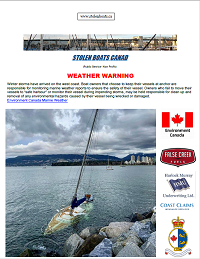 |
WEATHER
WARNING
Winter
storms have arrived on the west coast. Boat owners that choose
to keep their vessels at anchor are responsible for monitoring
marine weather reports to ensure the safety of their vessel.
Owners who fail to move their vessels to “safe harbour”
or monitor their vessel during impending storms, may be held
responsible for clean up and removal of any environmental
hazards caused by their vessel being wrecked or damaged.
Environment
Canada Marine Weather |
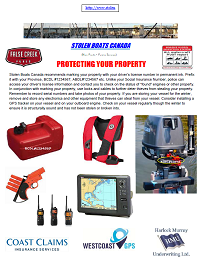 |
PROTECTING
YOUR PROPERTY
Stolen
Boats Canada recommends marking your property with your driver’s
license number in permanent ink. Prefix it with your Province,
BCDL #1234567, ABDL#1234567 etc. Unlike your Social Insurance
Number, police can access your driver’s license information
and contact you to check on the status of “found”
engines or other property. In conjunction with marking your
property, use locks and cables to further deter thieves from
stealing your property. Remember to record serial numbers
and take photos of your property. If you are storing your
vessel for the winter, remove and store any electronics and
other equipment that thieves can steal from your vessel. Consider
installing a GPS tracker on your vessel and on your outboard
engine. Check on your vessel regularly though the winter to
ensure it is structurally sound and has not been stolen or
broken into. |
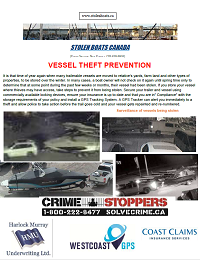 |
VESSEL
THEFT PREVENTION
It
is that time of year again when many trailerable vessels are
moved to relative’s yards, farm land and other types
of properties, to be stored over the winter. In many cases,
a boat owner will not check on it again until spring time
only to determine that at some point during the past few weeks
or months, their vessel had been stolen. If you store your
vessel where thieves may have access, take steps to prevent
it from being stolen. Secure your trailer and vessel using
commercially available locking devices, ensure your insurance
is up to date and that you are in” Compliance”
with the storage requirements of your policy and install a
GPS Tracking System. A GPS Tracker can alert you immediately
to a theft and allow police to take action before the trail
goes cold and your vessel gets repainted and re-numbered. |
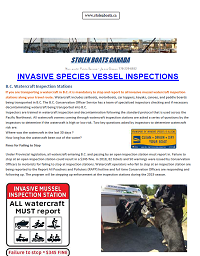 |
INVASIVE
SPECIES VEHICLE INSPECTIONS
If
you are transporting a watercraft in B.C. it is mandatory
to stop and report to all invasive mussel watercraft inspection
stations along your travel route. Watercraft includes sailboats,
motorboats, car toppers, kayaks, canoes, and paddle boards
being transported in B.C. The B.C. Conservation Officer Service
has a team of specialized inspectors checking and if necessary
decontaminating watercraft being transported into B.C.
Inspectors are trained in watercraft inspection and decontamination
following the standard protocol that is used across the Pacific
Northwest. All watercraft owners coming through watercraft
inspection stations are asked a series of questions by the
inspectors to determine if the watercraft is high or low risk.
Two key questions asked by inspectors to determine watercraft
risk are:
Where was the watercraft in the last 30 days?
How long has the watercraft been out of the water?
Fines for Failing to Stop Under Provincial legislation, all
watercraft entering B.C. and passing by an open inspection
station must report in. Failure to stop at an open inspection
station could result in a $345 fine. In 2018, 82 tickets and
50 warnings were issued by Conservation Officers to motorists
for failing to stop at inspection stations. Watercraft operators
who fail to stop at an inspection station are being reported
to the Report All Poachers and Polluters (RAPP) hotline and
full time Conservation Officers are responding and following
up. The program will be stepping up enforcement at the inspection
stations during the 2019 season. |
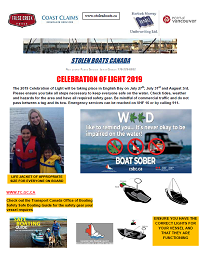 |
CELEBRATION
OF LIGHT 2019
The
2019 Celebration of Light will be taking place in English
Bay on July 27th, July 31st and August 3rd.
Please ensure you take all steps necessary to keep everyone
safe on the water. Check tides, weather and hazards for the
area and have all required safety gear. Be mindful of commercial
traffic and do not pass between a tug and its tow. Emergency
services can be reached on VHF 16 or by calling 911. |
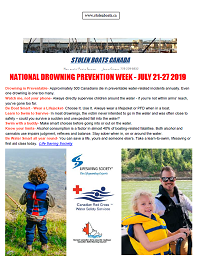 |
NATIONAL
DROWNING PREVENTION WEEK - JULY 21-27 2019
Drowning
is Preventable-
Approximately 500 Canadians die in preventable water-related
incidents annually. Even one drowning is one too many.
Watch me, not your phone-
Always directly supervise children around the water - if you’re
not within arms’ reach, you’ve gone too far.
Be Boat Smart - Wear a Lifejacket- Choose It. Use It. Always
wear a lifejacket or PFD when in a boat.
Learn to Swim to Survive-
In most drownings, the victim never intended to go in the
water and was often close to safety – could you survive
a sudden and unexpected fall into the water?
Swim with a buddy-
Make smart choices before going into or out on the water.
Know your limits-
Alcohol consumption is a factor in almost 40% of boating-related
fatalities. Both alcohol and cannabis use impairs judgment,
reflexes and balance. Stay sober when in, on or around the
water.
Be Water Smart all year round-
You can save a life, yours and someone else’s. Take
a learn-to-swim, lifesaving or first aid class today. Life
Saving Society |
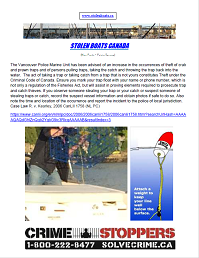 |
Theft of Prawn and Crab Traps
The Vancouver Police Marine Unit has been advised of an increase
in the occurrences of theft of crab and prawn traps and of persons
pulling traps, taking the catch and throwing the trap back into
the water. The act of taking a trap or taking catch from a trap
that is not yours constitutes Theft under $5000 in the Criminal
Code of Canada. Ensure you mark your trap float with your name
or phone number, which is not only a regulation of the Fisheries
Act, but will assist in proving elements required to prosecute
trap and catch thieves. If you observe someone stealing your
trap or your catch or suspect someone of stealing traps or catch,
record the suspect vessel information and obtain photos if safe
to do so. Also note the time and location of the occurrence
and report the incident to the police of local jurisdiction.
Case Law R.
v. Kearley, 2006 CanLII 1758 (NL PC) |
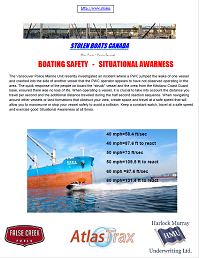 |
Boating Safety - Situational Awareness
The Vancouver Police Marine Unit recently investigated an incident
where a PWC jumped the wake of one vessel and crashed into the
side of another vessel that the PWC operator appears to have
not observed operating in the area. The quick response of the
people on board the “struck” vessel and the crew
from the Kitsilano Coast Guard base, ensured there was no loss
of life. When operating a vessel, it is crucial to take into
account the distance you travel per second and the additional
distance traveled during the half second reaction sequence.
When navigating around other vessels or land formations that
obstruct your view, create space and travel at a safe speed
that will allow you to manoeuvre or stop your vessel safely
to avoid a collision. Keep a constant watch, travel at a safe
speed and exercise good Situational Awareness at all times. |
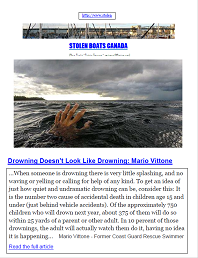 |
Drowning doesn't Look Like Drowning: Matt
Vittone
…When someone is drowning there is very little splashing,
and no waving or yelling or calling for help of any kind. To
get an idea of just how quiet and undramatic drowning can be,
consider this: It is the number two cause of accidental death
in children age 15 and under (just behind vehicle accidents).
Of the approximately 750 children who will drown next year,
about 375 of them will do so within 25 yards of a parent or
other adult. In 10 percent of those drownings, the adult will
actually watch them do it, having no idea it is happening…
Mario Vittone - Former Coast Guard Rescue Swimmer
Read
the full article |
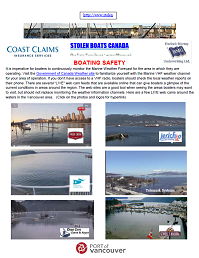 |
It is imperative for boaters to continuously monitor the
Marine Weather Forecast for the area in which they are operating.
Visit the Government of Canada Weather site to familiarize yourself
with the Marine VHF weather channel for your area of operation.
If you don’t have access to a VHF radio, boaters should
check the local weather reports on their phone. There are several
“LIVE” web cam feeds that are available online that
can give boaters a glimpse of the current conditions in areas
around the region. The web sites are a good tool when seeing
the areas boaters may want to visit, but should not replace
monitoring the weather information channels. (note: Bulletin
includes links to the live cams). |
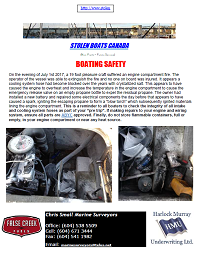 |
On the evening of July 1st 2017, a 19 foot pleasure craft
suffered an engine compartment fire. The operator of the vessel
was able to extinguish the fire and no one on board was injured.
It appears a cooling system hose had become blocked over the
years with crystallized salt. This appears to have caused the
engine to overheat and increase the temperature in the engine
compartment to cause the emergency release valve on an empty
propane bottle to expel the residual propane. The owner had
installed a new battery and repaired some electrical components
the day before that appears to have caused a spark, igniting
the escaping propane to form a “blow torch” which
subsequently ignited materials lining the engine compartment.
This is a reminder to all boaters to check the integrity of
all intake and cooling system hoses as part of your “pre
trip”. If making repairs to your engine and wiring system,
ensure all parts are ABYC
approved. Finally, do not store flammable containers, full or
empty, in your engine compartment or near any heat source. |
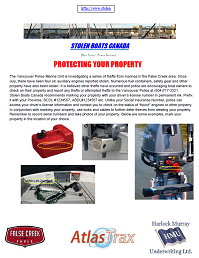 |
The Vancouver Police Marine Unit is investigating a series
of thefts from marinas in the False Creek area. Since July,
there have been four (4) auxiliary engines reported stolen.
Numerous fuel containers, safety gear and other property have
also been stolen. It is believed other thefts have occurred
and police are encouraging boat owners to check on their property
and report any thefts or attempted thefts to the Vancouver Police
at 604-717-3321. Stolen Boats Canada recommends marking your
property with your driver’s license number in permanent
ink. Prefix it with your Province, BCDL #1234567, ABDL#1234567
etc. Unlike your Social Insurance Number, police can access
your driver’s license information and contact you to check
on the status of “found” engines or other property.
In conjunction with marking your property, use locks and cables
to further deter thieves from stealing your property. Remember
to record serial numbers and take photos of your property. |
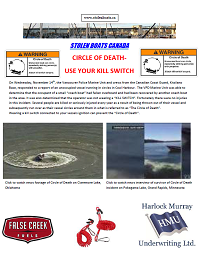 |
On Wednesday, November 14th, the Vancouver Police Marine
Unit and crews from the Canadian Coast Guard, Kitsilano Base,
responded to a report of an unoccupied vessel running in circles
in Coal Harbour. The VPD Marine Unit was able to determine
that the occupant of a small “coach boat” had
fallen overboard and had been recovered by another coach boat
in the area. It was also determined that the operator was
not wearing a “KILL SWITCH”. Fortunately there
were no injuries in this incident. Several people are killed
or seriously injured every year as a result of being thrown
out of their vessel and subsequently run over as their vessel
circles around them in what is referred to as “The Circle
of Death”. Wearing a kill switch connected to your vessels
ignition can prevent the “Circle of Death”.
Click here
to watch news footage of Circle of Death on Claremore Lake,
Oklahoma
Click here
to watch news interview of survivor of Circle of Death incident
on Pokegama Lake, Grand Rapids, Minnesota |
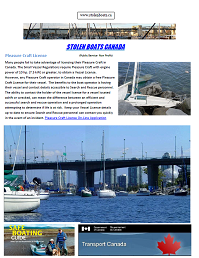 |
Many
people fail to take advantage of licensing their Pleasure Craft
in Canada. The Small Vessel Regulations require Pleasure Craft
with engine power of 10 hp. (7.5 kW) or greater, to obtain a
Vessel License. However, any Pleasure Craft operator in Canada
may obtain a free Pleasure Craft License for their vessel. The
benefits to the boat operator is having their vessel and contact
details accessible to Search and Rescue personnel. The ability
to contact the holder of the vessel license for a vessel located
adrift or wrecked, can mean the difference between an efficient
and successful search and rescue operation and a prolonged operation
attempting to determine if life is at risk. Keep your Vessel
License details up to date to ensure Search and Rescue personnel
can contact you quickly in the event of an incident. Pleasure
Craft License On-Line
Application. |
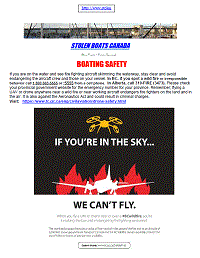 |
If
you are on the water and see fire fighting aircraft skimming
the waterway, stay clear and avoid endangering the aircraft
crew and those on your vessel. In BC, if you spot a wild fire
or irresponsible behavior call 1 800 663-5555 or *5555 from
a cell phone. In Alberta, call 310-FIRE (3473). Please check
your provincial government website for the emergency number
for your province. Remember; flying a UAV or drone anywhere
near a wild fire or near working aircraft endangers fire fighters
on the land and in the air. It is also against the Aeronautics
Act and could result in criminal charges.
Visit: https://www.tc.gc.ca/eng/civilaviation/drone-safety.html |
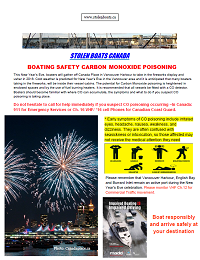 |
This
New Year’s Eve, boaters will gather off Canada Place
in Vancouver Harbour to take in the fireworks display and
usher in 2018. Cold weather is predicted for New Year’s
Eve in the Vancouver area and it is anticipated that many
boaters taking in the fireworks, will be inside their vessel
cabins. The potential for Carbon Monoxide poisoning is heightened
in enclosed spaces and by the use of fuel burning heaters.
It is recommended that all vessels be fitted with a CO detector.
Boaters should become familiar with where CO can accumulate,
the symptoms and what to do if you suspect CO poisoning is
taking place.
Do
not hesitate to call for help immediately if you suspect CO
poisoning occurring –In Canada:
911 for Emergency Services or Ch. 16 VHF/ *16 cell Phones
for Canadian Coast Guard.
Early
symptoms of CO poisoning include irritated eyes, headache,
nausea, weakness, and dizziness. They are often confused with
seasickness or intoxication, so those affected may not receive
the medical attention they need. |
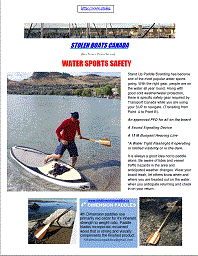 |
Stand
Up Paddle Boarding has become
one of the most popular water sports
going. With the right gear, people are on the water all year
round. Along with
good cold weather/water protection,
there is specific safety gear required by Transport Canada
while you are using your SUP to navigate. (Transiting from
Point A to Point B):
- An approved PFD for all on the board
- A Sound Signaling Device
- A 15 M Buoyant Heaving Line
- A Water Tight Flashlight (if operating
in limited visibility or in the dark).
It is always a good idea not to paddle
alone. Be aware of tides and vessel
traffic hazards in the area and anticipated weather changes.
Wear your board leash, let others know when and where you
are headed out on the water, when you anticipate returning
and check in on your return. |
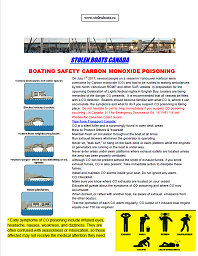 |
On
July 1st 2017, several people on a vessel in Vancouver Harbour
were overcome by Carbon monoxide (CO) and had to be rushed to
waiting ambulances by the North Vancouver RCMP and other SAR
vessels. In preparation for the upcoming Celebration of Lights
festival nights in English Bay, boaters are being reminded of
the danger CO presents. It is recommended that all vessels be
fitted with a CO detector. Boaters should become familiar with
what CO is, where it can accumulate, the symptoms and what to
do if you suspect CO poisoning is taking place. |
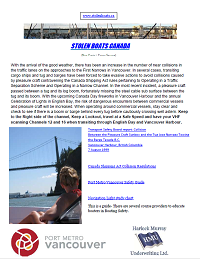 |
With
the arrival of the good weather, there has been an increase
in the number of near collisions in the traffic lanes on the
approaches to the First Narrows in Vancouver. In several cases,
transiting cargo ships and tug and barges have been forced
to take evasive actions to avoid collisions caused by pleasure
craft contravening the Canada Shipping Act rules pertaining
to Operating in a Traffic Separation Scheme and Operating
in a Narrow Channel. In the most recent incident, a pleasure
craft passed between a tug and its log boom, fortunately missing
the steel cable sub surface between the tug and its boom.
With the upcoming Canada Day fireworks in Vancouver Harbour
and the annual Celebration of Lights in English Bay, the risk
of dangerous encounters between commercial vessels and pleasure
craft will be increased. When operating around commercial
vessels, stay clear and check to see if there is a boom or
barge behind every tug before cautiously crossing well astern.
Keep to the Right side of the channel, Keep a Lookout, travel
at a Safe Speed and have your VHF scanning Channels 12 and
16 when transiting through English Bay and Vancouver Harbour.
Transport
Safety Board report: Collision Between the Pleasure Craft
Sunboy and the Tug Jose Narvaez Towing the Barge Texada B.C.
Vancouver Harbour, British Columbia
7 August 1999
Canada
Shipping Act Collision Regulations
Port
Metro Vancouver Safety Guide
Navigation Light study chart
This is a guide- There are several course providers to educate
boaters in Boating Safety. |
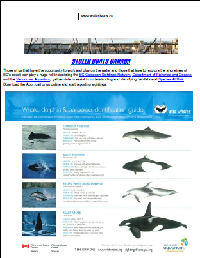 |
BC
Cetacean Sighting Network
Those
of us that have the opportunity to work and play on the water
and those that love to explore the shorelines of BC’s
coast, can play a huge roll in assisting the BC
Cetacean Sightings Network, Department
of Fisheries and Oceans and the Vancouver
Aquarium, gather data to assist in understanding and identifying
habitats and Species
At Risk.
Download the App , call or go online and start reporting sightings. |
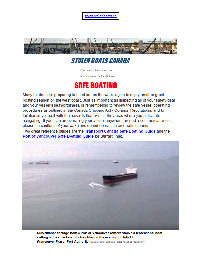 |
Boating
Safety - Rules of the Road
Many
boaters are preparing to head out on the water again to enjoy
another great boating season on the west coast. Just as important
as inspecting all of your safety gear and your vessel’s
seaworthiness, is remembering to review the safe vessel operating
procedures as outlined in the Canada Shipping Act - Collision
Regulations, and to familiarize yourself with the hazards
that exist in the areas where you anticipate navigating. If
you plan on operating your vessel anywhere around a commercial
vessel, please be cautious of your wake and do not operate
in an erratic manner.
Two great reference guides are the Transport
Canada Safe Boating Guide and the Port
of Vancouver Safe Boating Guide for Burrard Inlet. |
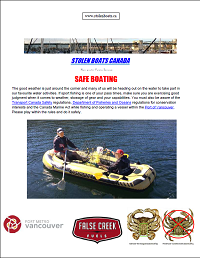 |
Safe
Boating
The
good weather is just around the corner and many of us will
be heading out on the water to take part in our favourite
water activities. If sport fishing is one of your pass times,
make sure you are exercising
good judgment when it comes to weather, stowage of gear and
your capabilities. You must also be aware of the Transport
Canada Safety regulations, Department of Fisheries and Oceans
regulations for conservation interests and the Canada Marine
Act while fishing and operating a vessel within the Port of
Vancouver. Please play within the rules and do it safely. |
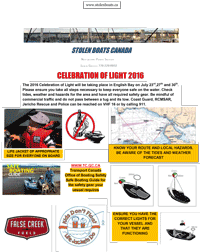 |
2016
Celebration of Lights
The
2016 Celebration of Light will be taking place in English
Bay on July 23rd, 27th and 30th.
Please ensure you take all steps necessary to keep everyone
safe on the water. Check tides, weather and hazards for the
area and have all required safety gear. Be mindful of commercial
traffic and do not pass between a tug and its tow. Coast Guard,
RCMSAR, Jericho Rescue and Police can be reached on VHF 16
or by calling 911. |
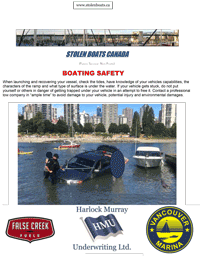 |
Launching
and Recovering
When
launching and recovering your vessel, check the tides, have
knowledge of your vehicles capabilities, the characters of
the ramp and what type of surface is under the water. If your
vehicle gets stuck, do not put yourself or others in danger
of getting trapped under your vehicle in an attempt to free
it. Contact a professional tow company in “ample time”
to avoid damage to your vehicle, potential injury and environmental
damages. |
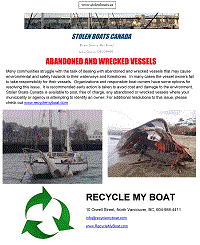 |
Many
communities struggle with the task of dealing with abandoned
and wrecked vessels that may cause environmental and safety
hazards to their waterways and foreshores. In many cases the
vessel owners fail to take responsibility for their vessels.
Organizations and responsible boat owners have some options
for resolving this issue. It is recommended early action is
taken to avoid cost and damage to the environment.
Stolen Boats Canada is available to post, free of charge, any
abandoned or wrecked vessels where your municipality or agency
is attempting to identify an owner. For additional resolutions
to this issue, please check out www.recyclemyboat.com
. |
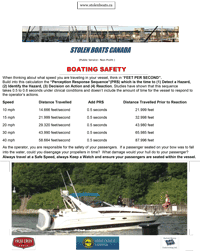 |
Boating
Safety
When
thinking about what speed you are traveling in your vessel,
think in “FEET PER SECOND”. Build into this calculation
the “Perception Response Sequence”(PRS) which
is the time to (1) Detect a Hazard, (2) Identify the Hazard,
(3) Decision on Action and (4) Reaction. Studies have shown
that this sequence takes 0.5 to 0.6 seconds under clinical
conditions and doesn’t include the amount of time for
the vessel to respond to the operator’s actions.
|
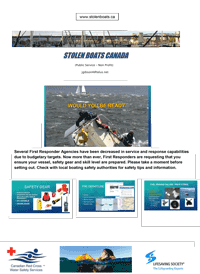 |
Boating
Safety
Several First Responder Agencies have been decreased in service
and response capabilities due to budgetary targets. Now more
than ever, First Responders are requesting that you
ensure your vessel, safety gear and skill level are prepared.
Please take a moment before setting out. Check with local
boating safety authorities for safety tips and information. |
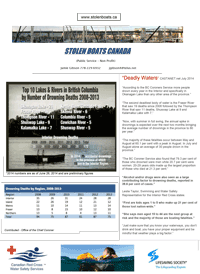 |
Deadly
Waters
According to the BC Coroners Service more people drown every
year in the Interior and specifically in Okanagan Lake than
any other area of the province.
Just
make sure that you know your waterways, you don't drink and
boat, you have your proper equipment and be mindful that weather
plays a big factor. |
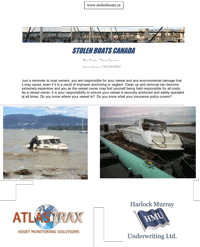 |
Just
a reminder to boat owners, you are responsible for your vessel
and any environmental damage that it may cause, even if it is
a result of improper anchoring or neglect. Clean up and removal
can become extremely expensive and you as the vessel owner may
find yourself being held responsible for all costs.
As a vessel owner, it is your responsibility to ensure your
vessel is securely anchored and safely operated at all times.
Do you know where your vessel is? Do you know what your insurance
policy covers? |
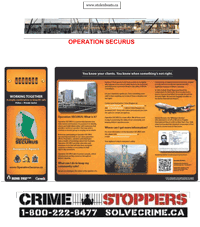 |
Operation
Securus |
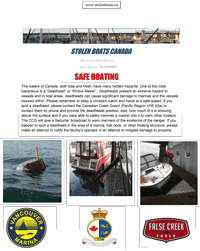 |
The
waters of Canada, both tidal and fresh, have many hidden hazards.
One of the most hazardous is a “Deadhead” or “Widow
Maker”. Deadheads present an extreme hazard to vessels
and in tidal areas, deadheads can cause significant damage to
marinas and the vessels moored within. Please remember to keep
a constant watch and travel at a safe speed. If you spot a deadhead,
please contact the Canadian Coast Guard (Pacific Region VHF
83a) or contact them by phone and provide the deadheads position,
size, how much of it is showing above the surface and if you
were able to safely hammer a marker into it to warn other boaters.
The CCG will give a Securite’ broadcast to warn mariners
of the existence of the danger. If you happen to spot a deadhead
in the area of a marina, fuel dock, or other floating structure,
please make an attempt to notify the facility’s operator
in an attempt to mitigate damage to property. |
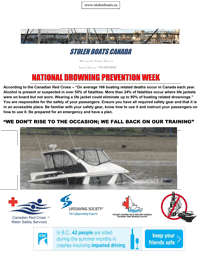 |
According
to the Canadian Red Cross – “On average 166 boating
related deaths occur in Canada each year.
Alcohol is present or suspected in over 50% of fatalities.
More than 24% of fatalities occur where life jackets were
on board but not worn. Wearing a life jacket could eliminate
up to 90% of boating related drownings.”
You are responsible for the safety of your passengers. Ensure
you have all required safety gear and that it is in an accessible
place. Be familiar with your safety gear, know how to use
it and instruct your passengers on how to use it. Be prepared
for an emergency and have a plan. |
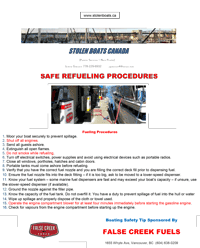 |
Safe
Fueling Procedures |
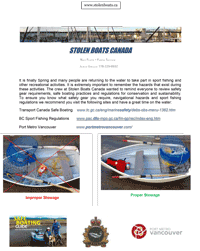 |
It
is finally Spring and many people are returning to the water
to take part in sport fishing and other recreational activities.
It is extremely important to remember the hazards that exist
during these activities. The crew at Stolen Boats Canada wanted
to remind everyone to review safety gear requirements, safe
boating practices and regulations for conservation and sustainability. |





